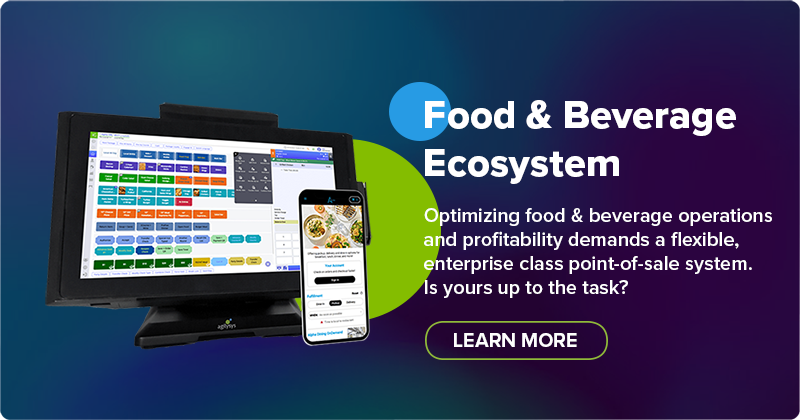
- Solutions
- Food & Beverage Ecosystem
Food & Beverage Ecosystem
Optimizing food & beverage operations and profitability demands a flexible, enterprise-class point-of-sale system. Is yours up to the task?
Go- Hospitality & Leisure Ecosystem
Hospitality & Leisure Ecosystem
From an individual location to an enterprise chain, get the most modern, mobile solution for managing your hospitality business
Go
- Inventory & Procurement Ecosystem
Inventory & Procurement Ecosystem
Designed to optimize foodservice and retail inventory and procurement operations for hotels, resorts, universities, restaurants and others.
Go
- Professional Services
Professional Services
Hospitality businesses are global, 24/7 operations with complex technology demands. You don’t have to go it alone.
Go
- Solution Studios
- Hotels
Hotels
Whether you operate a single boutique location or a large hotel chain, there’s an Agilysys hotel solution for you.
Go- Resorts
Resorts
Whether you operate a single boutique location or a large complex resort, your property is a unique operation that requires robust solutions supported by an experienced technology partner
Go
- Casinos
Casinos
You’re more than a gaming operation. You’re a full-service casino resort property and success isn’t about playing the odds, it’s about making the most of every revenue opportunity.
Go
- Tribal Gaming
Tribal Gaming
A leader in casino hospitality management solutions who respects the sovereignty of your nation.
Go
- Cruise Lines
Cruise Lines
Smooth seas ahead: technology solutions from Agilysys, a leader in cruise management systems.
Go
- Higher Education
- Corporate Dining
Corporate Dining
Identify emerging dining trends while aligning coverage with demand and capturing more revenue.
Go
- Healthcare
Healthcare
Delight patients & visitors, retain staff and grow margins with a suite of hospitality solutions for healthcare environments.
Go
- Life Plan Communities
- Foodservice Management
Foodservice Management
End-to-end foodservice management software solutions for optimum productivity and profitability.
Go
- Stadiums
- Restaurants
- Airports
Airports
Optimizing dozens of food & beverage outlets throughout your facility demands world-class POS performance combined with real-time operating insights.
Go
- Resorts
- Resources
- Articles
Articles
Access our library and read about the latest in emerging technology and other hospitality trends. Find tips and insights on accelerating business growth and improving guest satisfaction.
Go- Customer Stories
Customer Stories
Learn why so many businesses, small and large, partner with Agilysys for their hospitality technology needs.
Go
- Customer Videos
Customer Videos
Watch and learn what Agilysys customers have to say about their experiences with our solutions.
Go
- Product Resources
Product Resources
An in-depth collection of product information and datasheets. Read about the latest in hospitality technology features designed to solve the challenges faced by hospitality professionals around the globe.
Go
- Product Showcase
Product Showcase
Hear from industry professionals about the latest advancements, including tips and tricks, in hospitality and emerging technologies. Check out the library of demo videos and webinar recordings.
Go
- Webinars
Webinars
Watch and learn about the latest in successful technology trends and hear from hospitality professionals in this selection of interactive videos.
Go
- Industry Reports
Industry Reports
Important research and studies from across the hospitality industry. Find out what thought leaders are saying.
Go
- Customer Stories
- Company
- Leadership
- Solution Partners
Solution Partners
Agilysys has a broad collection of partners and APIs to help you assemble the perfect solution for you.
Go
- Our Customers
Our Customers
Discover how Agilysys customers like you are using our solutions to improve their business and guest experience.
Go
- Investor Relations
- News
- Events
Events
With the Agilysys commitment to 100% Hospitality solutions, we take industry events and conferences seriously. Please see where you can find Agilysys to learn more.
Go
- Career
- FAQS
FAQS
Go
- Solution Partners
- Support
- Contact Support
- Microsoft Patch Testing
Microsoft Patch Testing
See what Microsoft products and versions are currently support by Agilysys.
Go
- Payment Center
- RMA Requests
- Supply Order
Supply Order
Go
- Hospitality IQ
Hospitality IQ
Go
- Knowledge Center
Knowledge Center
Go
- Microsoft Patch Testing
- Blogs
- MyAgilysys
-
 Get a Demo
Get a Demo 877 369 6208
877 369 6208
×Home
☰- Explore
WHAT'S THE BUZZ IN HOSPITALITY?
How to Improve Hotel Revenue Through Guest Loyalty Programs
In the competitive hospitality industry, guest loyalty programs have emerged as a powerful strategy for driving revenue and building lasting relationships with customers. Hotels that prioritize loyalty programs not only retain guests but also benefit from increased bookings, higher spending per guest, and long-term advocacy. This blog explores how well-designed guest loyalty programs can significantly improve hotel revenue, along with actionable tips for implementing or enhancing one at your property.
The Importance of Guest Loyalty
The concept of guest loyalty goes beyond simply rewarding repeat customers. Loyalty programs build emotional connections with guests, transforming casual visitors into devoted brand advocates. Research shows that acquiring a new customer can cost five times more than retaining an existing one, making loyalty initiatives a cost-effective way to boost revenue.

Moreover, loyal guests are more likely to:
- Spend more during their stay on premium amenities, dining, or services.
- Recommend the property to friends and family.
- Choose your hotel over competitors, even when price differences exist.
When effectively executed, hotel guest loyalty programs create a win-win scenario: guests feel valued, and hotels benefit from increased revenue and reduced marketing costs.
How Guest Loyalty Programs Drive Revenue
Guest loyalty programs can impact revenue in several ways:
1. Encourage Repeat Stays
Loyalty programs incentivize guests to return by offering rewards such as free nights, upgrades, or exclusive perks. Repeat guests reduce the reliance on third-party booking platforms, saving on commission fees and increasing direct bookings.
2. Boost Ancillary Spending
By offering loyalty points for in-hotel purchases—like dining, spa services, or gift shop items—hotels can encourage guests to spend more during their stay. These incremental revenues contribute significantly to overall profitability.
3. Increase Guest Lifetime Value
A well-structured loyalty program ensures that guests remain engaged with the brand over time. By extending the relationship beyond a single stay, hotels can maximize the lifetime value of each guest.
4. Enhance Upselling Opportunities
Loyalty members are more likely to consider premium room options or upgrades, especially when these choices come with added rewards. This drives revenue while enhancing the guest experience.
5. Foster Direct Bookings
Loyalty programs often encourage guests to book directly through the hotel’s website or app, avoiding high commission fees from third-party booking platforms like OTAs.

Best Practices for Implementing Guest Loyalty Programs
To ensure the success of a loyalty program, hotels must align it with guest expectations and operational goals. Here are key strategies to consider:
1. Create a Simple and Clear Structure
The success of a loyalty program hinges on its ease of use. Complicated systems can deter participation. Design a program that is straightforward, with clear benefits and easy-to-understand earning and redemption rules. For example:
- Earn 10 points for every $1 spent.
- Redeem 1,000 points for a free night or other perks.
2. Offer Tiered Membership Levels
Introducing tiered membership levels (e.g., Silver, Gold, Platinum) motivates guests to engage more deeply. Each level can offer escalating rewards, such as free upgrades, early check-in, late check-out, or exclusive event access. The progression incentivizes frequent stays and higher spending.
3. Focus on Personalization
Guests value programs that feel tailored to their preferences. Use data analytics to track guest behavior and preferences, then offer personalized rewards or recommendations. For instance, if a guest frequently books spa services, you could offer them a complimentary spa voucher as part of their loyalty perks.
4. Integrate Technology
An efficient loyalty program leverages technology for seamless implementation. Mobile apps and online portals allow guests to track points, redeem rewards, and receive exclusive offers. Integration with property management systems ensures that rewards are automatically calculated and applied.
5. Partner with Local Businesses
Expand the appeal of your loyalty program by partnering with local businesses or attractions. For example, guests could earn points for dining at a nearby restaurant or gain exclusive access to a local event. These collaborations enhance the guest experience and provide added value.
6. Promote the Program Effectively
Guests won’t join your loyalty program if they don’t know it exists. Promote it through multiple channels:
- Highlight the program during the booking process.
- Train front-desk staff to explain its benefits at check-in.
- Use email campaigns and social media to engage existing members and attract new ones.
7. Reward Loyalty Beyond Stays
Consider offering points or perks for actions like referring a friend, booking through the hotel’s website, or sharing positive reviews online. These incentives build a stronger connection between the guest and your brand.

Case Study: A Loyalty Program Success Story
One hotel chain that effectively increased revenue through guest loyalty is Marriott with its Bonvoy program. By offering a mix of points-based rewards, exclusive events, and member-only rates, Marriott successfully engaged millions of travelers worldwide. Guests are motivated to book directly to earn points, which can be redeemed for stays, dining, or travel experiences. This approach not only enhances customer loyalty but also significantly boosts revenue across Marriott’s properties.
Measuring Success
To determine the effectiveness of your loyalty program, track key performance indicators such as:
- Repeat Booking Rates: Are loyalty members returning more frequently?
- Average Spend Per Guest: Are members spending more on ancillary services?
- Guest Retention Rates: Are you retaining guests over time?
- Direct Booking Growth: Are fewer bookings coming from third-party platforms?
Use these metrics to refine your program and ensure it continues to meet both guest expectations and business objectives.
Final Thoughts
Guest loyalty programs are no longer optional in today’s competitive hospitality landscape—they are essential. By fostering repeat business, increasing ancillary spending, and encouraging direct bookings, loyalty programs unlock new revenue opportunities while strengthening relationships with guests.
A well-designed loyalty program not only boosts revenue but also positions your property as a preferred destination for travelers seeking value and exceptional experiences. Start building guest loyalty today and watch your hotel’s revenue soar.

2026 Hospitality Industry Conferences You Shouldn't Miss
Read More
The 2025 Global Hospitality Study
Download Study
The Guest Economy: Top 5 Hospitality Technology Predictions for 2026
Learn MoreCategories
- Contact Support
- Leadership
- Articles
- Hotels
- Food & Beverage Ecosystem




